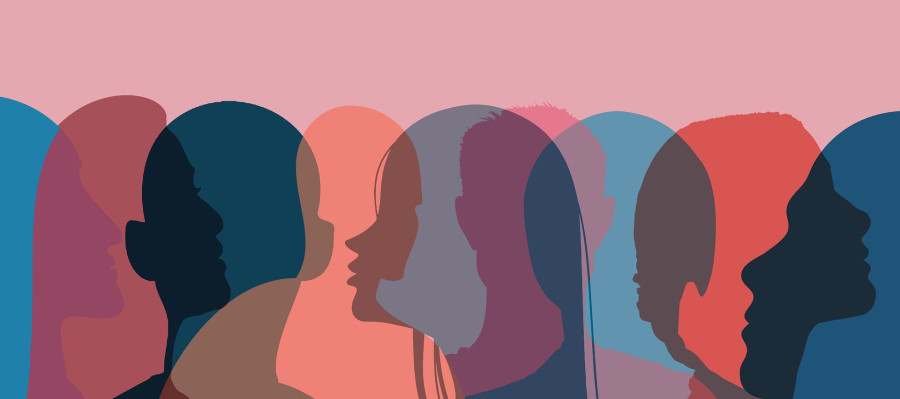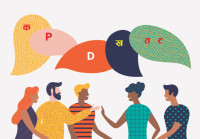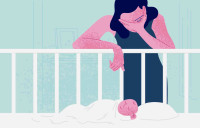As it is
The far-reaching impact of gender essentialism
Our societies exploit the idea of gender essentialism as a rationale for upholding regressive and rigid gender roles and stereotypes.
Pasang Dorjee
I wasn’t necessarily picked on during my adolescent years (not blatantly), nor during college— all thanks to internalising heteronormativity at a really early age. But it wouldn’t be right to brush off those instances where everyone around you starts emulating this distorted sense of pride in “being a man” and impel yourself to embody some truly ridiculous notions surrounding masculinity — and how that impacted my psyche. You start to develop a kind of hyper-awareness of your surroundings and a sixth sense regarding all the nuances in social settings.
Whether it be dinner table talk, just a normal hang out with “the boys” or how you would verbalise anything, my anxiety pertaining to such random situations to not come off as even a slightly bit feminine in any way, used to be downright ridiculous. All of this sprung from an uncomfortable place of not being able to come to terms with my own sexuality— yes— but ultimately, it stemmed from life-long programming of gender essentialism that is ever-so ubiquitous and accepted.
Gender essentialism is the belief that a human being is either perpetually and intrinsically male and masculine, or female and feminine. It entails biological sex being the primary factor in discerning one’s gender. This idea has been discredited by feminists and gender theorists dating back to the 1960s and 1970s because it has come at the perils of both men and women, but more importantly, it has caused grave harm to transgender, non-binary, and gender non-conforming people.
Our societies exploit the idea of gender essentialism as a rationale for upholding regressive and rigid gender roles and stereotypes. As a queer man, it is downright ridiculous, if not frustrating when people want you to look, sound or act a certain way to accommodate their version of what a queer person should be like. I don’t know if I should sprinkle confetti all over my face the next time someone says “Oh, but you don’t look that way?” —as though there are some criteria I need to meet to qualify as someone’s interpretation of that word.
On the flip side of this, however, I find myself encountering those people (men) who befriend me on the sole basis of me not “looking queer.” This is another massive problem that reinforces the idea of specific heteronormative ways that non-hetero folks adapt that are considered “acceptable”, and is done so mostly in a subtle way. And believe me when I say that sexism, homophobia, gender essentialism or any problematic aspect of our society (you name it) works best when it is subtle. It’s not necessarily that adopting “masculine” traits is intrinsically a “bad” thing, but the way it has historically been used to the detriment of women and queer people, primarily rooted in the economic power struggle, is what especially needs to be addressed.
The way femininity is universally considered as being secondary — passive, emotional, submissive, the “other” —is what has significantly contributed to this notion of a man embodying any of those traits as “emasculating”. This is a problem that affects men, of course, but the damage it does to women everywhere is severely dehumanising.
Think about how, especially in professional contexts, this narrative of a man being the default subject plays out. Whenever you think of a police officer or a doctor, it becomes kind of a given that it’s a man, right? And if it isn’t obvious like I said, we still preface a woman doing the same job by calling them “lady-police” or a “woman doctor”. This seems harmless at face value, but there is always more than what meets our senses.
When we reduce a person’s competence down to the gender they identify with, it instils a certain level of inadequacy and in worst cases, imposter syndrome, that primarily women, queer, and gender non-conforming people have to wrestle with. I have had multiple friends confide in me regarding this, especially when they pursue the STEM field which is traditionally male-centric. When we instinctively assume that so-and-so job is done by men, we risk capable and qualified individuals feeling insufficient in their roles because there is always a “man around to do the job.”
Our socio-psychological conditioning may try and discard this reality, however, the goal of this insidious nature of gender stereotypes is primarily to maintain power and economic hegemony over mainly women and queer people. Stripping people away from their subjectivity breeds a lack of self-autonomy, dysphoria, objectification (being treated as a means to someone else’s end), which ultimately maintains and perpetuates oppression.
Comprehending this concept of what it means to be a man or a woman from an existentialist point of view, and how we as a species have simply relied on this binary to help us navigate our lives (and understandably so, to an extent), will help each of us unpack the harsh reality behind gender essentialism. It is a pernicious problem that has been ever so prevalent as though it is hammered into our brains, and has rooted itself in our subconscious. The keyword there being ‘subconscious’ because a lot of the “problems” that stem from this patriarchal fabric of the world are not always done intentionally. It is the way things are done, isn’t it? A man is supposed to “suck it up, take responsibility, and put food on the table.”
I’m not saying there’s anything wrong with taking responsibility; the whole crux of existentialism is about personal freedom and responsibility. But it is primarily about acknowledging that our “existence precedes essence”, which means that the labels and the “meaning” that exist in the world is not inherent to us but we later inherit or create through the socio-cultural context one finds themselves in. “One is not born, but rather becomes a woman”, as the twentieth-century feminist-existentialist philosopher, Simone de Beauvoir puts it.
It is absolutely insane how boys are wired into believing the most absurd of things like it is “less than” to associate yourselves with anything remotely “not masculine”. Even the most conventional of all scenarios such as listening to a female pop artist can be subject to all the nuances of mockery and criticism.
Likewise, many women are also complacent in accepting some of the stereotypical characteristics, unwittingly or not, of how they have to present themselves a certain way to fit the mould of what it means to be a woman.
This doesn’t entail women having to question femininity altogether but that there often lies people in this spectrum of “womanhood” who start to patronise and perform moral grandstanding when other women do not necessarily fit into their perception of what it means to embody “femininity.”
Once we realise the absurdity dressed up in machismo, and the “othering” of feminine traits, we can all individually and collectively attempt to unlearn a gazillion different things, and strive towards how we first define what it means to be human, rather than being fixated on what is between our legs and how that should dictate our life.




 15.95°C Kathmandu
15.95°C Kathmandu








.jpg&w=300&height=200)

